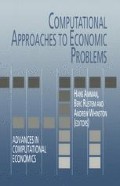Abstract
In the future, data communication networks’ interoperability will become critical from both technological and business strategy perspective. Significance of interoperability has to be evaluated in terms of the overall economic performance of the system. In this paper we present our view of the future of data communication networks, challenges in interoperability, and the economic challenges that will arise in this “real-time” economy. We provide insights derived from applying economic general equilibrium approach to these networks, e.g., the impact of competition and interoperability on the competing entities that own different parts of the network. We believe that potential excessive congestion is the single largest obstacle in the feasibility of a global, interoperable network. We discuss simulation experiments we have carried out to determine approximate priority prices in real-time and discuss the potential benefits in managing congestion through such a pricing scheme. We define a framework for policy research for an interoperable network which may facilitate electronic commerce. We also discuss the issues related to market structures such as monopoly, duopoly, and more competitive ownership of the parts of public data communication networks.
This research was funded in part by National Science Foundation grant #IRI-9005969 and #IRI-9225010, but does not necessarily reflect the views of the NSF. Partial support was also provided by the Texas Advanced Research Program.
Access this chapter
Tax calculation will be finalised at checkout
Purchases are for personal use only
Preview
Unable to display preview. Download preview PDF.
References
Bohn, R., H.-W. Braun, and S. Wolff, 1994, #x2018;Mitigating the coming Internet crunch: Multiple service levels via precedence’, Technical Report, San Diego, Supercomputer Center, University of California at San Diego, ftp://ftp.sdsc.edu/pub/sdsc/anr/papers/precedence.ps.Z.
Gupta, A., D.O. Stahl, and A.B. Whinston, 1996a, #x2018;An economic approach to network computing with priority classes’, Journal of Organizational Computing and Electronic Commerce 6 (1), 71–95.
Gupta, A., D.O. Stahl, and A.B. Whinston, 1996b, #x2018;Pricing of services on The Internet’, in W.W. Cooper, D. Gibson, F. Phillips, and S. Thore (Eds), IMPACT: How 1C2 Research Affects Public Policy and Business Markets, Westport: Quorum Books, forthcoming.
Gupta, A., D.O. Stahl, and A.B. Whinston, 1996c, A stochastic equilibrium model of Internet pricing’, Journal of Economic Dynamics and Control, forthcoming.
MacKie-Mason, J. and H. Varian, 1995, Pricing congestible network resources’, IEEE Journal of Selected Areas in Communications 3, 32–51. Available from ftp://gopher. econ.lsa.umich.edu/pub/Papers/pricing-congestible.ps.Z.
Mendelson, H. and S. Whang, 1990, Optimal incentive-compatible priority pricing in the M/M/1 queue’, Operations Research 38, 870–883.
Oi, W., 1971, #x2018;A Disneyland dilemma: Two-part tariffs for a Mickey Mouse monopoly’, Quarterly J. of Econ. 85, 79–96.
Scotchmer, S., 1985a, #x2018;Profit-maximizing clubs’, J. of Public Economics 27, 25–45. Scotchmer, S., 1985b, #x2018;Two-tier pricing of shared facilities in a free-entry equilibrium’, Rand J. of Econ. 16, 456–472.
Shenker, S., 1995, #x2018;Service models and pricing policies for an integrated services Internet’, in B. Kahin and J. Keller (Eds), Public Access to the Internet, Cambridge, MA: MIT Press, forthcoming.
Stahl, D., 1992, #x2018;Evolution of smart players’, Games and Economic Behavior 5, 604–617.
Editor information
Editors and Affiliations
Rights and permissions
Copyright information
© 1997 Springer Science+Business Media Dordrecht
About this chapter
Cite this chapter
Gupta, A., Stahl, D.O., Whinston, A.B. (1997). The Internet: A Future Tragedy of the Commons?. In: Amman, H., Rustem, B., Whinston, A. (eds) Computational Approaches to Economic Problems. Advances in Computational Economics, vol 6. Springer, Boston, MA. https://doi.org/10.1007/978-1-4757-2644-2_22
Download citation
DOI: https://doi.org/10.1007/978-1-4757-2644-2_22
Publisher Name: Springer, Boston, MA
Print ISBN: 978-1-4419-4770-3
Online ISBN: 978-1-4757-2644-2
eBook Packages: Springer Book Archive

